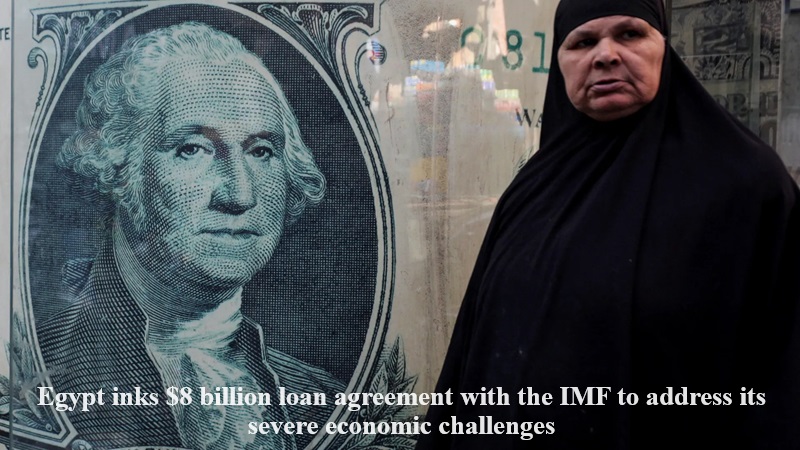
Egypt has secured a substantial $8 billion loan agreement with the International Monetary Fund (IMF) in a bid to tackle its severe economic challenges.
This agreement signifies a significant increase from the existing rescue program, more than doubling its size. The expansion comes after extensive measures implemented by Egypt, including a notable devaluation and a significant interest-rate hike, aimed at addressing the nation’s most severe foreign-currency shortage in decades.
The $8 billion agreement builds upon the $3 billion, 46-month Extended Fund Facility initially negotiated with the IMF in December 2022. Delays in this program arose as Egypt temporarily reverted to a tightly managed exchange rate system and encountered obstacles in divesting state assets and enhancing the role of the private sector.
The new agreement is a crucial step towards Egypt’s economic recovery, particularly in light of the fallout from the war in Ukraine and subsequent investor withdrawals, which exposed the nation’s financial vulnerabilities.
In addition to the IMF deal, Egypt is also pursuing an additional loan from the IMF’s Resilience and Sustainability Facility, aimed at promoting climate transition financing. Prime Minister Mostafa Madbouly disclosed that the expected amount for this separate loan is $1.2 billion.
Ivana Vladkova Hollar, the IMF’s Egypt mission chief, underscored the move towards a unified market-determined exchange rate as part of the agreement. She emphasized that this framework would not only involve devaluations but also two-way movements in the exchange rate in response to economic conditions.
Policy discussions with the IMF have centered on commitments to a flexible exchange rate, fiscal consolidation, and reforms aimed at eliminating privileges for state-owned enterprises.
Under President Abdel Fattah al-Sisi, Egypt’s economic policies, including major projects such as the construction of a new capital city east of Cairo, have been a focal point. These projects, aimed at generating employment opportunities and fostering economic growth, have faced scrutiny amidst Egypt’s escalating debt burden.
The recent loan agreement, which comes less than two weeks after Egypt’s agreement with the Emirati sovereign wealth fund ADQ, adds momentum to the nation’s economic recovery efforts.
While the devaluation may raise short-term inflation concerns, Egyptian officials, including President Abdel-Fattah El-Sisi, are optimistic that these reforms will attract foreign investment and ultimately alleviate the country’s most severe economic crisis in decades.

Post Your Comments